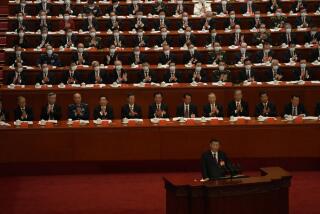Chinese Dissident Surfaces With Plea for Democracy
- Share via
BEIJING — After keeping a low profile for more than a year, China’s most prominent dissident, astrophysicist Fang Lizhi, reemerged Wednesday at Beijing University with an impassioned call for democracy.
Addressing about 500 students under trees on the campus lawn, Fang declared that democracy is an inherent aspect of modernization in any society.
“The concept of modernization, just like concepts of physics, cannot be divided according to nationality,” Fang said. “The standards of modernization are the same everywhere--economic, cultural, educational and political standards. There is no such thing as physics with Chinese characteristics . . . and there is no such thing as modernization with Chinese characteristics.”
Fang’s remarks, a play on the widely used term “socialism with Chinese characteristics,” provoked laughter and applause. The government has set modernization as the nation’s primary task but insists that it take place under Communist Party control.
After speaking for about 10 minutes, Fang listened as students expressed their views or asked questions, then responded with further comments.
Later he was mobbed by about half the people in the crowd seeking his autograph. The shoving was so intense that he moved behind a bench in a small pavilion.
During the 15 months since his expulsion from the party for allegedly instigating pro-democracy student demonstrations in late 1986, Fang has talked with a few foreign reporters, lectured on physics and been interviewed about his scientific work by Chinese journalists. But until Wednesday, he had not made any public speeches on political issues.
Fang, 52, who was dismissed as vice president of the Chinese University of Science and Technology in Hefei and is now a researcher at the Beijing Observatory, could not have chosen a more symbolic date and place to raise his voice again.
An anti-government and anti-Japanese student demonstration in Beijing on May 4, 1919, is revered as the start of the nationalistic and democratic May 4th Movement. In the history of student activism in China, Beijing University, the nation’s most prestigious educational institution, stands at the forefront.
There was a festive atmosphere at the university Wednesday, with a formal celebration to mark the 90th anniversary of its founding. Stalls selling everything from books to T-shirts to tapes of American pop music were set up, and alumni mixed with the students.
In his remarks, Fang appeared to defend himself against charges that as a physicist, he should stick to his specialty and stay out of politics.
Saying that he had visited more than 20 countries, he noted that developed countries have varied cultures, cuisines and other specific differences but that they all share high levels of education, income and democracy.
“Freedom is the same everywhere,” he went on. “You can’t say that Chinese freedom of speech is somehow different from foreign freedom of speech. How can they be different? . . . What physicists do is look for the most basic and universal things. Universal things exist not only in science. There are also universal things in society.”
More to Read
Sign up for Essential California
The most important California stories and recommendations in your inbox every morning.
You may occasionally receive promotional content from the Los Angeles Times.










